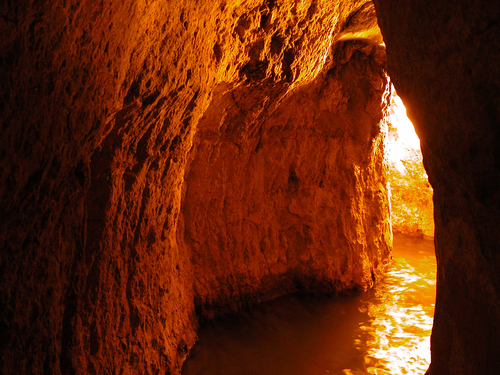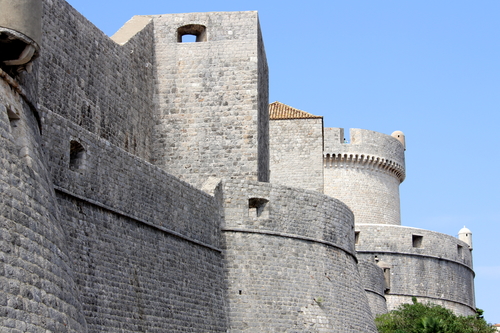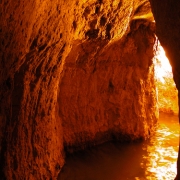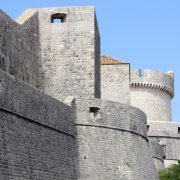Un triste final para una buena vida
/0 Comments/in Devocional Semanal/by David GuzikSpecial Note: During this season of the Coronavirus, I’m doing a special daily devotional on YouTube. Click here for today’s video devotional.
Entonces Ezequías dijo a Isaías: La palabra de Jehová que has hablado, es buena. Después dijo: Habrá al menos paz y seguridad en mis días. Los demás hechos de Ezequías, y todo su poderío, y cómo hizo el estanque y el conducto, y metió las aguas en la ciudad, ¿no está escrito en el libro de las crónicas de los reyes de Judá? Y durmió Ezequías con sus padres, y reinó en su lugar Manasés su hijo. (2 Reyes 20:19-21)
A través del profeta Isaías, Dios le advirtió al rey Ezequías que vendría el juicio sobre sus descendientes. Ezequías reaccionó un poco raro, diciendo: La palabra de Jehová que has hablado, es buena. Este fue un triste estado de animo del rey de Judá. Dios anunció el juicio venidero, y todo lo que pudo hacer es responder con alivio de que no sucedería en su vida.

Por esto, Ezequías demostró ser casi exactamente lo contrario de una persona “centrada en los demás”. Era casi totalmente egocéntrico. Lo único que le importaba era su propia comodidad personal y éxito. A Ezequías no le importaba si sus pecados ayudaban a traer juicio a sus descendientes, siempre y cuando él fuera librado.
Sin embargo, estos versículos también nos hablan de algo bueno que hizo Ezequías: hizo el estanque y el conducto, y metió las aguas en la ciudad de Jerusalén. Esta fue una hazaña de ingeniería increíble. Ezequías dirigió la construcción de un acueducto para llevar agua fresca dentro de las murallas de la ciudad, incluso cuando un ejército la rodeaba. Medía más de 643 metros de largo a través de roca sólida, comenzando en cada extremo y juntándose en el medio. Todavía se puede ver el día de hoy, y desemboca en el estanque de Siloé. Si nunca has caminado por el túnel de Ezequías, es muy divertido, solo recuerda que caminarás por el agua que todavía fluye en el túnel y está muy oscuro.
Al final de todo, durmió Ezequías con sus padres. No hay duda de que Ezequías comenzó como un rey piadoso, y en general su reinado fue de una extraordinaria piedad (2 Reyes 18: 3-7). Sin embargo, su comienzo fue mucho mejor que su final; Ezequías no terminó bien. Dios le dio a Ezequías el regalo de 15 años más de vida, pero los años adicionales no lo hicieron en un hombre mejor o más piadoso.
El tiempo o la edad no necesariamente nos hacen mejorar. Tenga en cuenta que el tiempo no hace más que pasar, hora por hora y día a día.
A veces decimos: “El tiempo dirá”, “El tiempo sanará” o “El tiempo sacará el potencial en mí”. Pero el tiempo no hará ninguna de estas cosas. El tiempo solo vendrá y se irá. Lo único que importa es cómo usamos el tiempo. Ezequías no hizo buen uso del tiempo extra que el Señor le dio. Dios ayudándonos, en Jesús podemos tomar mejores decisiones y terminar fuertes en nuestros últimos años.
Das traurige Ende eines guten Lebens
/0 Comments/in Wöchentliche Andacht/by David GuzikDa sprach Hiskia zu Jesaja: Das Wort des Herrn, das du geredet hast, ist gut! Denn, sprach er, es wird ja doch Friede und Sicherheit sein zu meinen Lebzeiten!
Was aber mehr von Hiskia zu sagen ist, und alle seine großen Taten, und wie er den Teich und die Wasserleitung erbaute und das Wasser in die Stadt leitete, ist das nicht aufgezeichnet im Buch der Chronik der Könige von Juda? Und Hiskia legte sich zu seinen Vätern; und sein Sohn Manasse wurde König an seiner Stelle.
Gott warnte König Hiskia durch den Propheten Jesaja, dass auf ihn und seine Nachkommen Gericht kommen würde. Hiskias Reaktion darauf war seltsam, denn er sagte das Wort, das du geredet hast, ist gut. Das Herz des König von Juda war in einem traurigen Zustand. Gott kündigte Gericht an, und er reagierte erleichtert, weil dies nicht mehr zu seinen Lebzeiten passieren sollte.

Damit zeigte Hiskia, dass andere Menschen ihm eigentlich egal waren. Er war hier sehr ichbezogen. Alles was ihn kümmerte, war seine eigene Bequemlichkeit und sein Erfolg. Hiskia war es egal, dass auch seine Sünden das Gericht auf seine Nachkommen brachten, solange es ihn nicht traf.
Doch diese Verse erzählen uns auch von etwas Gutem, das Hiskia getan hatte. Wie er den Teich und die Wasserleitung erbaute und das Wasser in die Stadt leitete. Das war eine technische Meisterleistung. Hiskia leitete den Bau eines Aquädukts, der frisches Wasser in die Stadt brachte, selbst wenn sie von einerr Armee belagert wäre. Er war fast 650 Meter lang und bestand aus festem Gestein. Man kann ihn heute noch sehen und er endet im Teich von Siloam. Wenn du noch nie durch Hiskias Tunnel gelaufen bist – was wirklich Spaß macht – stell dir vor du gehst durch das Wasser, das immer noch durch den Tunnel fließt, und es ist echt dunkel darin.
Schießlich legte Hiskia sich zu seinen Vätern. Ohne Zweifel begann Hiskia seine Regierung als gottgefälliger König, und insgesamt war seine Regierung von herausragender Gottesfurcht geprägt (2. Könige 18,3-7). Doch sein Anfang war viel besser als sein Ende. Gott gab Hiskia 15 weitere Jahre zu leben, doch die weiteren Jahre machten ihn nicht zu einem besseren Mann.
Zeit oder Alter machen uns nicht zwangsläufig besser. Bedenke, dass Zeit nichts anderes macht als zu vergehen, Stunde um Stunde, Tag für Tag.
Manchmal sagen wir: „Mit der Zeit wird alles gut,“ oder „die Zeit heilt alle Wunden,“ oder „die Zeit wird es zeigen.“ Doch Zeit macht nichts von alledem. Zeit vergeht einfach nur. Es geht darum, wie wir die Zeit nutzen. Hiskia nutzte die Extrazeit, die Gott ihm gegeben hatte, nicht gut. Gott helfe uns, dass wir bessere Entscheidungen treffen und bis zum Ende stark sind darin.
Into the Wilderness
/1 Comment/in For Pastors, Preachers, Bible Teachers/by David GuzikDear Pastor, Preacher, or Bible Teacher –
Do you remember this event from the life of Jesus?
Then Jesus was led up by the Spirit into the wilderness
to be tempted by the devil. (Matthew 4:1)
Immediately after Jesus identified with sinful humanity through His baptism, the Holy Spirit then led Him to the wilderness to be tempted by the devil. The Gospel of Mark says it even stronger, saying that the Holy Spirit “drove” Jesus to the wilderness.

As servants of the Lord, we all want to be led by the Holy Spirit. It’s one of our deepest desires. Just remember that the Holy Spirit made lead us to uncomfortable places with many challenges. For some reason, I sometimes think that if I’m really led by the Spirit, life will be a constant progress from one happy experience to another. Matthew 4:1 reminds us that the Holy Spirit has a purpose even in the challenges we face.
This was a remarkable contrast between the “then” connected to the glory of Jesus’ baptism and the “now” of His challenge in the wilderness.
Then, the cool waters of the Jordan; now the barren wilderness.
Then, the big crowds; now solitude and silence.
Then, the Spirit rested like a dove; now the Spirit drove Him into the wilderness.
Then, the voice of the Father calling Him “Beloved Son”; now the hiss of Satan the tempter.
Then, anointed; now attacked.
Then, the water of baptism; now the fire of temptation.
Then, the heavens were opened; now it seemed that hell was open wide.
So, in the challenges you face right now – if the Holy Spirit has led or even driven you to them, then God will use them for good. Don’t lose heart. Don’t be afraid of the circumstances; if God is for you, who can be against you?
You don’t need circumstances on your side; you need God’s victory, and it is found in Jesus Christ. Remember that Adam failed in a beautiful garden and Jesus was victorious in a barren wilderness.
The same Jesus has filled you, called you, anointed you, and sent you the Holy Spirit – even if now it feels like you are in the wilderness.
Blessings to You in Jesus’ Name – David Guzik
Click Here to Receive Email from David for Pastors, Preachers, and Bible Teachers
They Paid No Attention
/0 Comments/in Weekly Devotional/by David GuzikSpecial Note: During this season of the Coronavirus, I’m doing a special daily devotional on YouTube. Click here for today’s video devotional.
So Hezekiah said to Isaiah, “The word of the LORD which you have spoken is good!” For he said, “Will there not be peace and truth at least in my days?” Now the rest of the acts of Hezekiah— all his might, and how he made a pool and a tunnel and brought water into the city— are they not written in the book of the chronicles of the kings of Judah? So Hezekiah rested with his fathers. Then Manasseh his son reigned in his place. (2 Kings 20:19-21)
Through the prophet Isaiah, God warned King Hezekiah that judgment was coming upon his descendants. Hezekiah had a strange reaction, saying the word of the LORD which you have spoken is good. This was a sad state of heart in the king of Judah. God announced coming judgment, and all he could respond with was relief that it would not happen in his lifetime.

Manasseh also raised up altars for Baal, and made a wooden image (2 Kings 21:3). Instead of imitating his godly father, Manasseh imitated one of the very worst kings of Israel: Ahab. He set up the same kind of state-sponsored idolatry.
Even worse, Manasseh worshiped all the host of heaven and served them (2 Kings 21:5). He brought in new forms of idolatry. He also corrupted the true worship of God at the temple when he built altars in the house of the LORD (2 Kings 21:5). It is horrible to even think of it, but Manasseh also sacrificed his own son to the Canaanite god Molech, who was worshipped with the burning of children (2 Kings 21:6).
Manasseh directly invited Satanic influence when he also practiced soothsaying, used witchcraft, and consulted spiritists and mediums (2 Kings 21:6). Manasseh made the temple into an idolatrous brothel, dedicated to the goddess Asherah (2 Kings 21:7).
When all these terrible things happened, where were the people of God? 2 Kings 21:9 tells the terrible truth: they paid no attention, and Manasseh seduced them to do more evil. This described the basic attitude of the people of Judah during the 55-year reign of Manasseh. They paid no attention to the generous promises of God, promising protection to His obedient people. In addition, they were willingly seduced by Manasseh’s wickedness and were attracted to do more evil.
Manasseh was indeed a wicked king, but perhaps the greater sin was on the part of the people who accepted this seduction willingly. 2 Chronicles 33:10 says, And the LORD spoke to Manasseh and his people, but they would not listen. God spoke to both the people and the leader, but they rejected His word.
The culture changed from something generally God-honoring to something that glorified idolatry and immorality. In general, we can say this happened because the people wanted it to happen. They didn’t care about the direction of their culture.
May God help you to be salt and light wherever He has placed you. With the love and grace of Jesus Christ, we need to preserve like salt does, and shine like light does. Let it never be said of us, “they paid no attention.”
A Sad End to a Good Life
/0 Comments/in Weekly Devotional/by David GuzikSpecial Note: During this season of the Coronavirus, I’m doing a special daily devotional on YouTube. Click here for today’s video devotional.
So Hezekiah said to Isaiah, “The word of the LORD which you have spoken is good!” For he said, “Will there not be peace and truth at least in my days?” Now the rest of the acts of Hezekiah— all his might, and how he made a pool and a tunnel and brought water into the city— are they not written in the book of the chronicles of the kings of Judah? So Hezekiah rested with his fathers. Then Manasseh his son reigned in his place. (2 Kings 20:19-21)
Through the prophet Isaiah, God warned King Hezekiah that judgment was coming upon his descendants. Hezekiah had a strange reaction, saying the word of the LORD which you have spoken is good. This was a sad state of heart in the king of Judah. God announced coming judgment, and all he could respond with was relief that it would not happen in his lifetime.

In this, Hezekiah showed himself to be almost the exact opposite of an “others-centered” person. He was almost totally self-centered. All he cared about was his own personal comfort and success. Hezekiah didn’t care if His sins helped to bring judgment upon his descendants, just so long as it spared him.
Yet, these verses also tell us of something good Hezekiah did. He made a pool and a tunnel and brought water into the city of Jerusalem. This was an amazing engineering feat. Hezekiah directed the building of an aqueduct to bring fresh water inside the city walls even when an army surrounded the city. It was more than 650 yards long (643 meters) through solid rock, begun on each end and meeting in the middle. It can still be seen today, and it empties into the pool of Siloam. If you have never walked through Hezekiah’s tunnel, it’s a lot of fun – just remember you’ll walk through the water that still flows in the tunnel and it’s really dark.
At the end of it all, Hezekiah rested with his fathers. There is no doubt that Hezekiah started out as a godly king, and overall his reign was one of outstanding godliness (2 Kings 18:3-7). Yet his beginning was much better than his end; Hezekiah did not finish well. God gave Hezekiah the gift of 15 more years of life, but the added years did not make him a better or a godlier man.
Time or age doesn’t necessarily make us any better. Consider that time does nothing but pass by, hour by hour and day by day.
We sometimes say, “Time will tell,” “Time will heal,” or “Time will bring out the potential in me.” But time won’t do any of these things. Time will only come and go. It is only how we use time that matters. Hezekiah didn’t make good use of the extra time the Lord gave him. God helping us, in Jesus we can make better choices, and finish strong in our latter years.
La trampa del éxito
/0 Comments/in Devocional Semanal/by David GuzikEn aquel tiempo Merodac-baladán hijo de Baladán, rey de Babilonia, envió mensajeros con cartas y presentes a Ezequías, porque había oído que Ezequías había caído enfermo. Y Ezequías los oyó, y les mostró toda la casa de sus tesoros, plata, oro, y especias, y ungüentos preciosos, y la casa de sus armas, y todo lo que había en sus tesoros; ninguna cosa quedó que Ezequías no les mostrase, así en su casa como en todos sus dominios. (2 Reyes 20:12-13)
Dios fue tan bueno con el rey Ezequías que le dio 15 años más de vida. Pero dependía de Ezequías si esos años se vivirían con sabiduría y para la gloria de Dios. Este fue un desafío que Ezequías no cumplió muy bien.

Después de su recuperación, el rey de Babilonia envió mensajeros con cartas y presentes a Ezequías, porque había oído que Ezequías había caído enfermo. Aparentemente este era un gesto amable del rey de Babilonia al mostrar preocupación por Ezequías como compañero de realeza.
Ezequías se contentó con estos presentes. Podemos imaginar que esto fue halagador para el rey Ezequías. Después de todo, Judá era una nación humilde con poco poder, y Babilonia era una superpotencia menor. Recibir atención y reconocimiento del rey de Babilonia debe haber hecho que Ezequías realmente sintiera que era importante.
Entonces, Ezequías les mostró toda la casa de sus tesoros. Ezequías probablemente quería complacer a estos mensajeros de Babilonia y quería mostrarles que deberían estar impresionados. Por eso, hizo todo lo posible para impresionarlos, y les mostró las mejores riquezas de la casa real, y les mostró todo (ninguna cosa quedó que Ezequías no les mostrase, así en su casa como en todos sus dominios).
Como lo demostrará la venida reprimenda de Isaías, esto no fue más que una tontería orgullosa por parte de Ezequías. Estaba en el lugar peligroso de querer complacer e impresionar a los hombres, especialmente a hombres impíos.
Ezequías enfrentó, y fracasó bajo, una tentación común para muchos, especialmente aquellos en el ministerio: la tentación del éxito. Muchos hombres que se mantienen fuertes contra las tentaciones del fracaso y la debilidad fracasan bajo las tentaciones del éxito y la fuerza.
Podríamos decir que el éxito llevó a Ezequías a pecar al menos de cinco formas:
- Orgullo, porque estaba orgulloso de los honores que trajeron los mensajeros.
- Ingratitud, porque tomó honor a sí mismo que realmente pertenecía a Dios.
- Abusando del bien hecho a él, porque tomó los presentes para su propio honor y gratificación de sus lujurias (2 Crónicas 32:25-26).
- Confianza carnal, porque confió en la coalición que había hecho con el rey de Babilonia.
- Perdiendo oportunidad, porque tuvo una gran oportunidad para testificar a los enviados de Babilonia sobra la grandeza de Dios y la bendición del Señor sobre Judá. En cambio, se glorificó a sí mismo.
Cuando Dios te dé éxito, sé agradecido, pero también ten cuidado. Cuidado con la trampa del éxito.
Die Falle des Erfolgs
/0 Comments/in Wöchentliche Andacht/by David GuzikZu jener Zeit sandte Berodach-Baladan, der Sohn Baladans, der König von Babel, einen Brief und Geschenke an Hiskia, denn er hatte gehört, daß Hiskia krank gewesen war. Hiskia aber schenkte ihnen Gehör und zeigte ihnen sein ganzes Schatzhaus, das Silber und das Gold und die Spezereien und das kostbare Öl, und sein ganzes Zeughaus samt allem, was sich in seinen Schatzkammern vorfand. Es gab nichts in seinem Haus und im ganzen Bereich seiner Herrschaft, das Hiskia ihnen nicht gezeigt hätte. (2. Könige 20,12-13)
Gott war so gut zu Hiskia und schenkte ihm weitere 15 Jahre zu leben. Doch es lag an Hiskia, ob er diese Jahre weise und zu Gottes Ehre nutzte. Diese Herausforderung meisterte Hiskia nicht so gut.

Nach seiner Genesung schickte der König von Babel einen Brief und Geschenke an Hiskia, denn er hatte gehört, daß Hiskia krank gewesen war. Offensichtlich war das eine freundliche Geste von ihm, mit der er seine Sorge um seinen Kollegen ausdrückte.
Hiskia gefielen diese Geschenke sehr. Man kann sich vorstellen, wie sehr das Hiskia geschmeichelt hat. Schließlich war Juda nur eine kleine Nation mit wenig Einfluß, und Babel war eine junge Supermacht. Solche Aufmerksamkeit und Anerkennung vom babylonischen König zu bekommen, ließ Hiskia sich sehr wichtig vorkommen.
Also zeigte Hiskia ihnen sein ganzes Schatzhaus. Er wollte die Gesandten von Babel wohl zufriedenstellen und ihnen etwas zeigen, womit er sie beeindrucken konnte. Also tat er alles, um Eindruck auf sie zu machen und zeigt ihnen die Reichtümer des Königshauses – und er zeigte ihnen alles (Es gab nichts in seinem Haus und im ganzen Bereich seiner Herrschaft, das Hiskia ihnen nicht gezeigt hätte).
Wie die folgende Zurechtweisung durch Jesaja deutlich macht, war das nichts als stolze Narrheit auf seiten Hiskias. Er wollte Menschen beeindrucken, und zwar gottlose Menschen, und das war gefährlich.
Hiskia stand eine Versuchung gegenüber – und versagte – nämlich der Versuchung, die viele betrifft, insbesondere solche, die im Dienst stehen: der Versuchung des Erfolgs. Viele Menschen, die der Versuchung des Versagens und der Schwachheit widerstehen können, geben der Versuchung von Erfolg und Stärke nach.
Man kann sagen, der Erfolg führte Hiskia zur Sünde in mindestens fünf Aspekten:
- Stolz, er war stolz auf die Ehre, die die Babylonier ihm zuteil werden ließen
- Undankbarkeit, er nahm die Ehre für sich, die eigentlich Gott zustand
- er missbrauchte die Gaben, die ihm gegeben wurden, er nahm die Geschenke für sich selbst, zur Erfüllung seiner Begierden
- fleischliche Zuversicht, er vertraute auf die Koalition, die er mit dem König von Babel eingegangen war
- verpasste Gelegenheit, er hatte die große Gelegenheit, den Gesandten von Babel von Gottes Größe und den Segnungen des HERRNfür Juda zu erzählen. Doch stattdessen verherrlichte er sich selbst
Wenn Gott dir Erfolg schenkt, sei dankbar – aber auch vorsichtig. Achte auf die Falle des Erfolgs.





